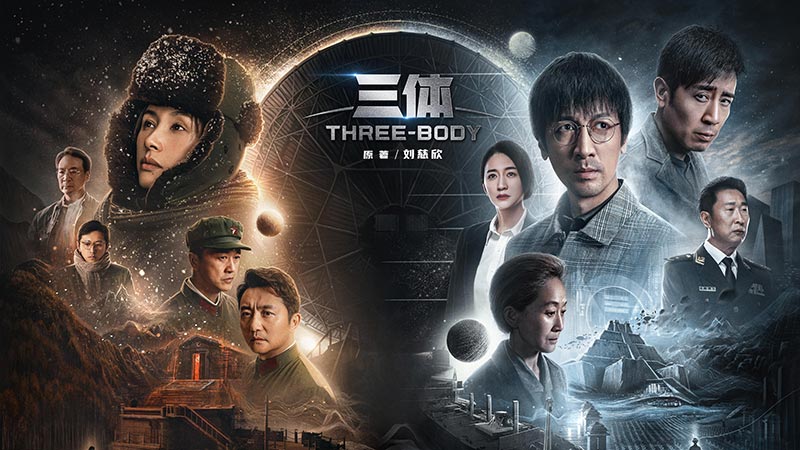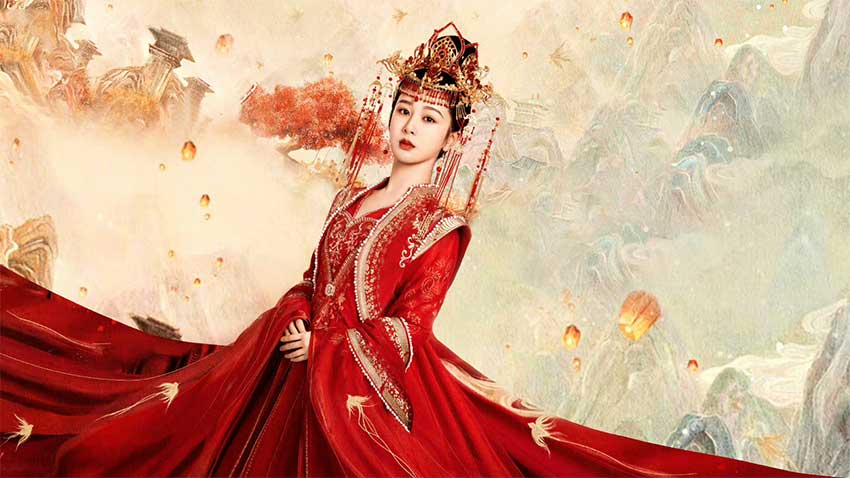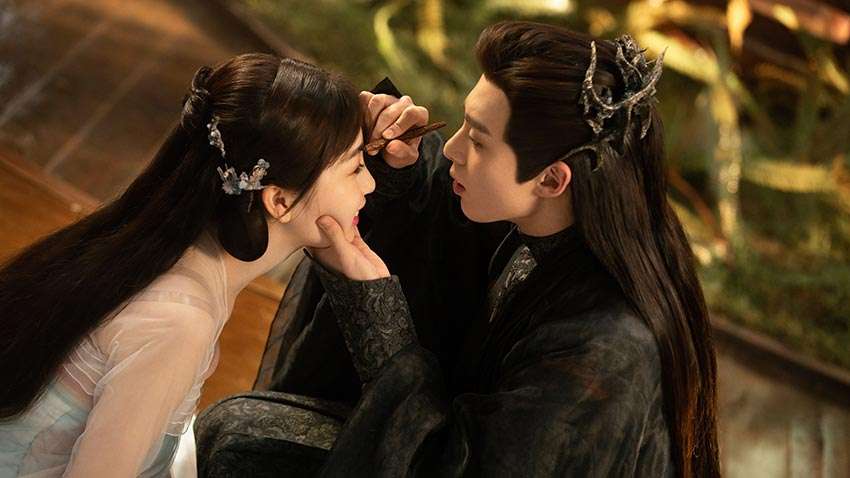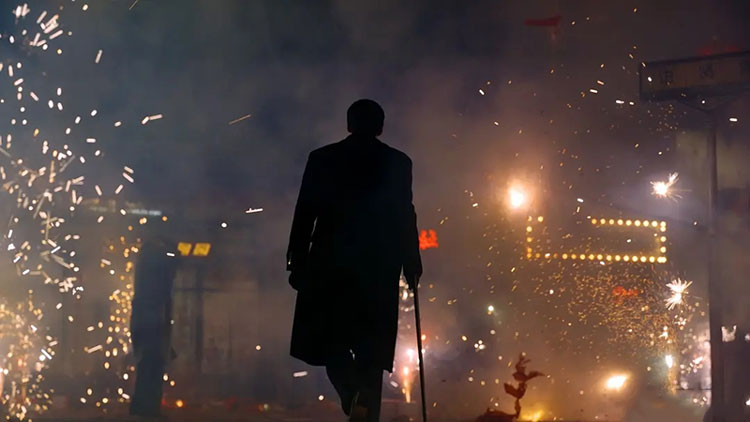“Starting from The Wandering Earth, Chinese science fiction movies have officially set sail.” Liu Cixin said.
“Starting from Three-Body, the era of Chinese science fiction dramas has begun.” Countless drama fans said.

The Three-Body Chinese drama is adapted from the long science fiction novel “The Three-Body Problem” written by the famous Hugo Award winner Liu Cixin. Currently, only the first part has been filmed. It mainly introduces the crisis encountered by the basic science of the earth. After the investigation of several protagonists, it goes a step further to conclude that there exists a civilization higher than our level of science and technology in the universe.
The show was not well-received when it first launched, because the original work was already very exciting. If it is adapted well, it will be justified. If it is not adapted well, it will be ridiculed. Moreover, the Three-Body has a certain threshold for ordinary people. Many abstract and conceptual descriptions in the book are not so easy to understand.
However, the drama version embodied many abstract descriptions in the book. Whether they are fans of the novel or ordinary viewers of the drama, they can understand the content of the story.
Therefore, the further we go into the play, the more we will be shocked by the story. So far, the rating on Douban has increased from the initial score of 8.1 to the current high score of 8.7 rated by more than 400,000 people, which is enough to illustrate the success of “The Three-Body Problem” in film and television.
Respecting the original, adapting from the heart
A popular comment from a fan online: “He really read the original! I cried.”
Three-Body Chinese drama is basically filmed according to the storyline of the original novel, which is divided into three lines. One main line is the step-by-step revelation of the truth about ETO in 2007, one branch line is the past events of Red Coast in history, and one branch line is the progression of the Game Threebody.
The first episode of the series opens up the layout of the masterpiece. It must not only be impressive but also accurately display the temperament of Three-Body Problem.
In the beginning, Ye Wenjie sends a signal to the “Trisolarans” and receives a reply: Don’t answer! Don’t answer! Don’t answer!
The director’s camera language and atmosphere control accurately fit the original narrative:
“The fate of human civilization rests on these slender fingers.”
Ye Wenjie, who is desperate for mankind, calmly buries the future of the Earth. The critical action came to an abrupt end, but the audience who knew its meaning was instantly pulled into this magnificent science fiction masterpiece!
But the first The Three-Body Problem doesn’t have that much to do with science fiction, or with grand visual scenes. The entire plot of the book is more of a suspenseful mystery than sci-fi.
It is the process of peeling off the cocoons – making a painstaking investigation from “Why do scientists commit suicide?” to “What forces are controlling all this?”.
And the whole play is full of reality and even history.
The impact of the Trisolarans’ heaven-defying technological power is only conveyed to the audience through Wang Miao, Yang Dong, Ding Yi, and others. All the sci-fi parts are as vague as a mirage, near and far.
This is precisely the attraction of the first The Three-Body Problem.
In terms of the expression of the Three-Body TV series, the creators have appropriately exaggerated the influence and role of the organization The Frontiers of Science, and directly introduced Shen Yufei as the villain, making the audience wonder: Why The Frontiers of Science and Shen Yufei have such great power to force scientists to death, and even make the universe flicker for Wang Miao? What is the power behind them? Why should such a powerful force rely on believers on earth instead of appearing in person?
Such an adaptation allows the audience to enter the plot faster and understand the truth and the meaning behind science fiction.
There is also an adaptation of the protagonist Wang Miao’s life. The book states that he has a family, a wife, and a six-year-old son, but the author hardly describes the real communication between the couple, and rarely the father-son emotional interaction. This tends to give the impression of being a “tool”.
Drama is a visual art, and the protagonist needs to make the audience feel a sense of substitution and let the audience feel that he is a flesh-and-blood character. So a few life-like scenes are added to the play to make the characters more three-dimensional.
There are several emotional scenes where Wang Miao interacts with his daughter. For example, when Wang Miao’s glasses were stuck in the steam from a boiling pot, his daughter smiled and said, “Dad, your glasses.” Later in the plot, her daughter even thoughtfully gave Wang Miao eye drops.
While his wife was stewing fish, Wang Miao looked at the countdown in front of him and reminded his wife that the fish was almost ready.
These seemingly simple fragments of life are not included in the book, but they are very necessary elements in the series.
It allows us to see that while Da Shi and Wang Miao were intensely investigating, trying to uncover the mystery of the scientist’s suicide and find clues about the Trisolaran, the most people’s lives were still as routine and even boring as those of Wang Miao’s wife and daughter.
They do not realize that a huge crisis is coming that will completely change their lives. Only Wang Miao, Ding Yi, Da Shi, and others have to bear huge pressure and try to give ordinary people a chance to continue their boring lives!
This kind of contrast of “hearing thunder in silence” is also one of the charms of the Three-Body drama.
Of course, conversely, these life-like scenes also inject strength into Wang Miao’s heart.
That’s why he didn’t commit suicide like other scientists. He even cheered up and went to his daughter’s school to teach physics to the children.
This original plot also fleshes out the characters and story.
When many theoretical physicists lost their faith in science, Wang Miao, after some inner struggle, actually taught physics again to the children, talking about “two iron balls landing at the same time”, and the universality of science!
It is important to know that Wang Miao had ordered the restart of research on nano-flying blades, and the countdown had begun again. At this time, he was able to passionately popularize physics for children, which was precisely a kind of struggle to face a powerful unknown force, regaining his courage and belief!
This was an important change for him, and it paved the way for him to truly join forces with Da Shi to decipher the true identity of the Trisolarans.
The novel is two-dimensional and requires the reader’s imagination.
However, film and television are three-dimensional and need to establish a three-dimensional image for the audience to feel and experience directly.
The adaptation of the Three-Body TV series has finally completed the dimension-enhancing process from novel to film and television!
Well-cast and Superbly Acted
Zhang Luyi as Wang Miao
The success of the drama version of Wang Miao is of course inseparable from the superb acting skills of the actor Zhang Luyi.
At first, Zhang Lu successfully created an intellectual character with a bit of nerdiness with his eyes that were a little bit fearful, and his picky and closed-off body posture.
Moreover, Wang Miao’s various surreal encounters in this drama gave the actor greater room for performance.
The panic after the countdown was marked on the retina, the hysteria when scolding Shen Yufei, the despair after seeing that the opponent really has a way of making the universe flicker for him, and finally regaining confidence after being encouraged by Shi Qiang and the children…
The actor perfectly presented the step-by-step changes of the character with his excellent professionalism and accurate understanding of the character.
Zhang Luyi perfectly played Wang Miao, a nanotechnology otaku with strong empathy ability.
Yu Hewei as Shi Qiang
Wang Miao’s success is also inseparable from Shi Qiang, who has the most scenes with him. The two disliked each other at first – to be precise, Wang Miao disliked Shi Qiang unilaterally, while Shi Qiang spared no effort to tease him.
Later, they started to feel like an old married couple eating and drinking Erguotou together.
As soon as Shi Qiang’s golden phrase “Leather pants over cotton pants, there must be a reason. Either the cotton pants are too thin, or the leather pants are hairless”, Wang Miao immediately followed up and complained, “What a bullshit theory you are talking about”, and the rhythm and tone were also mastered in the right way.
The charm of Da Shi’s character is that he can present a complex but real and lovely image in a contradictory state such as “how unserious he appears to be on the outside, but how serious he wants to be on the inside”.
Yu Hewei accurately grasps Shi Qiang’s sharp, penetrating, and wise character, and performs an effect that is similar in spirit but different in form.
Although he does not have a rough face, which does not match the image of the original work, but with his excellent acting skills, he successfully performs the role of Da Shi, who is both reckless and subtle, and ruffian but stable.
Only such a reliable Da Shi can save Wang Miao who is on the verge of collapse.
Wang Ziwen as the young Ye Wenjie
Ye Wenjie is a highly intelligent astrophysicist with a rough fate, withdrawn personality, decisiveness, and coldness.
There was a crying scene, and the acting exploded.
Why is Ye Wenjie crying? It is because of the sentence “I hope that one day, I can call you, Comrade Ye Wenjie.”
At that time, the word “comrade” really means a lot and is even a necessary identity. What’s more, Ye Wenjie carries the “shackles” of Ye Zhetai’s reactionary intellectuals, and she is accused of being brainwashed by the bourgeoisie’s erroneous remarks. The word “comrade” means too much.
In just 20 seconds, Wang Ziwen went through shock, trying to calm down, red eyes, uncontrollable tears, and trembling in one go, with ease.
Chen Jin as the elderly Ye Wenjie
Chen Jin’s Ye Wenjie is also like a character who stepped out of a book. She seems to be kind, gentle, and frail, but it is hard to hide her dominance and oppression.
The avenger Ye Wenjie has long disappeared without a trace. The vicissitudes of time have left behind a kind and amiable intellectual old lady Ye Wenjie.
There are also more charming characters, such as General Chang Weisi played by Lin Yongjian, with contrasting roles and images.
Shen Yufei, played by Li Xiaoran, is beautiful, cold, and noble.
Yang Dong, a genius theoretical physicist played by He Dujuan, is quiet, gentle, and other-worldly.
etc.
Excellent Special Effects and Audiovisual
First of all, the presentation of the past events of Red Coast is very similar to the feeling described in the book. That kind of abstract yet practical feeling is conveyed through the drama.
Moreover, the musics of this part use a large number of golden songs of the era, such as “We Walk on the Road”, “Ode to Chairman Mao”, “Unity is Strength”, “The Undying Sun Rises on the Grassland”, “We Workers Have Strength” and “In the Field of Hope”, which are full of sense of the times.
In terms of detail presentation, many realistic memories include: The story of hongmao and lantu played on TV at Ye Wenjie’s home, which started broadcasting in 2006 and is a childhood memory of many people.
There is also the stuffed toy Stitch on the sofa in Wang Miao’s house, which was also an animated series broadcast on the children’s channel that year.
Especially the content related to science and technology, such as collider, radio telescope, etc., are all shot in relevant scientific research institutions, and the sense of reality and era are very appropriate.
When the plot enters the Trisolaran Civilization, the barbarism of the Shang and Zhou Dynasties, the ingenuity of Mozi model, the dampness around the Aztecs, the oppression under the magnificence of Europa, the unwillingness and surrender of the apocalyptic pendulum, and the mixing of the elements of Chinese and Western cultures, are all breathtaking.
The rough definition of science fiction is “the use of fantasy art forms to express a technological vision or the impact of social development on human beings.” The process of trying to solve the three-body problem in the game adds an aesthetic that travels through ancient and modern times.
Among them, the first time I felt shocked and perfectly presented the effect was the “Qin No. 1” human-formation computer!
What do we see? What do we hear? Von Neumann and Newton came to the East to offer advice to Emperor Qin Shihuang who spoke Shaanxi dialect. Accompanied by the high-pitched tunes of the traditional Chinese opera Huayin Laoqiang, tens of millions of soldiers who could only execute simple commands gathered together into a huge, clumsy, and majestic computer. It was the murmur from history and a roar towards the unknown future.
This feeling makes people so excited. The scene of the human-formation computer connects the past and the future, reality and fantasy, on-screen and off-screen at the same time.
Three-Body has proved with facts that even if the special effects and motion capture rendering effects are not top-notch, it will not affect the performance of good content. Creativity and beauty are achieved by technology, but they will never be limited by technology.
The most amazing technological display in the drama is the Operation Guzheng that can make people’s scalp numb.
This scene is not only the climax of the story before the end of Three-Body, but it is also the part with the most room for visual expression. It requires great effort both emotionally and rationally.
I won’t mention the effort behind the scenes, but just talk about the actual performance:
The discussion at the combat meeting was on point. The tit-for-tat confrontation and then sympathy between Shi Qiang and Stanton was full of “cool literature”. The preparation stage was all shot in the style of an action blockbuster;
When the nano-flying blade started to cut the hull, the originally tense and fast pace slowed down. How to cut the ship was given sufficient details. The shot cutting to Evans’ room also paid homage to the piano sound in Kung Fu Chinese film directed by Zhou Xingchi, everything from micro details to macro scenes is fully demonstrated.
I can’t say that the scene of Operation Guzheng is better than the original, but it can definitely be praised as “an adaptation of the plot that is no less than the original plot”.
Profound proposition, based on thinking
This drama has received such high praise not only because a group of veteran actors has told a good story with their acting skills, but also the most important thing is that a small detail in it can be a meaningful principle, prompting people to think about it.
For example,
Physicist Ye Wenjie believes that if the Trisolaran civilization surpasses that of the Earth, its moral standards must be higher than those of humans.
So she desperately presses the red button, hoping that the Trisolarans will come to Earth.
But she forgets that technology does not equal civilization, and civilization does not equal morality.
For another example,
Three-Body borrows a turkey story told by the philosopher Bertrand Russell, namely the Turkey Dilemma.
The human brain becomes dependent on its own experience, which is often not reliable, but rather solidifies the mind, making you numb and unresponsive when real danger approaches.
Sometimes, we have to think about whether the experiences we take for granted are correct?
Therefore, experience is important, but sometimes it can become a shackle, trapping you in a cage of cognition.
Also,
Ye Wenjie wants the Trisolarans to save mankind, but this drags the earth into hell.
Reporter Mu Xing wants to arouse public awareness of environmental protection, but she becomes the assistant of Pan Han, the core figure of the Adventists.
As Ye Wenjie once said, she lit the torch but could not control it.
A person with insufficient cognition is prone to do bad things with good intentions.
In the end, the starting point is good, but the result is evil.
This shows that kindness is indeed a valuable quality, but it tests not only EQ and IQ, but also cognition.
Furthermore,
Yang Dong’s professor committed suicide after seeing the results of the collision experiment.
Yang Dong also committed suicide after learning the truth about his mother’s collusion with the Trisolarans.
Countless scientists have ended their lives because of the collapse of their scientific beliefs.
Wang Miao also fell into great panic at first when there was a countdown in front of him.
He feared what would happen at the end of the countdown, would it be his death or the destruction of mankind?
However, he eventually switched to a different mindset.
He said that he saw the universe flickering, just like primitive people saw a projector. There is no need to be afraid of things that you don’t understand.
He said he was looking forward to what would happen when the countdown ended?
Since then, he come out of his panic.
So after thinking about it, we can also come up with a theory. All processes and results are games with ourselves. If you figure it out yourself, the whole world will take a detour. If you draw the ground as a prison for yourself, you will be beyond redemption.
The Trisolarans send the last words to the earth: You are worms.
Such wanton ridicule makes everyone despair.
Shi Qiang took Wang Miao to his hometown, a farmland on the North China Plain.
He pointed at the locusts in the sky and said:
There is a plague of locusts in the wheat fields. Humans are much more advanced than the insects. However, although we use helicopters to spray insecticides and use genetic modification to sterilize them, the insects are still fighting against humans.
Life also pursues us.
But if we endure the suffering, carry the pain, and live invulnerable to all poisons, fate will be helpless to us.
No matter how difficult it is for you, as long as you don’t give in, life will never defeat you.
At Last
People who like The Three-Body Problem joked:
People in the world can be divided into two types, one is those who like The Three-Body Problem and the other is those who have not read The Three-Body Problem.
Watching Three-Body, you can get a glimpse of the magnificent cosmology in a big way; you can gain insight into all kinds of dark and subtle human nature in the small part.
When we can not only feel the grand theme of a drama, but also think meaningfully about it, it means that the drama is indeed very successful, right? (I became a fan as a TV series lover…)



Leave a Reply